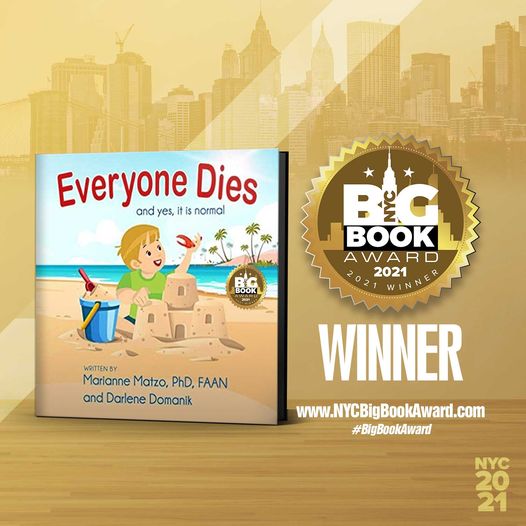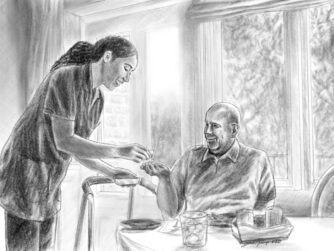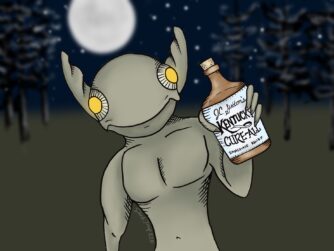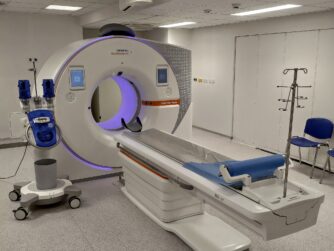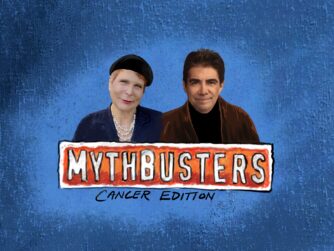Colorectal cancer is usually considered a disease of older adults, but now nearly one-third of colorectal cancer diagnosis are younger than age 55 with the biggest increase in diagnoses being seen in people ages 20-29. Colorectal cancer is the leading cause of cancer death in men younger than 50, and it ranks second only to breast cancer in women younger than 50.
This week we talk about what has changed that may account for this trend, what symptoms to pay attention to, and how to advocate for yourself to get a timely diagnosis.
In this Episode:
Transcript (click on “Transcript” tab)
- 01:41 – Recipe of the Week: Macaroni and Corn Casserole
- 03:59 – Arlington Cemetery: Preserving the Mementos Left at the Graveside
- 09:17 – Colorectal Cancer and the Rise of Early-Onset Disease
- 44:07 – Navigating a Strained Relationship at a Relative’s End of Life
- 55:35 – Outro
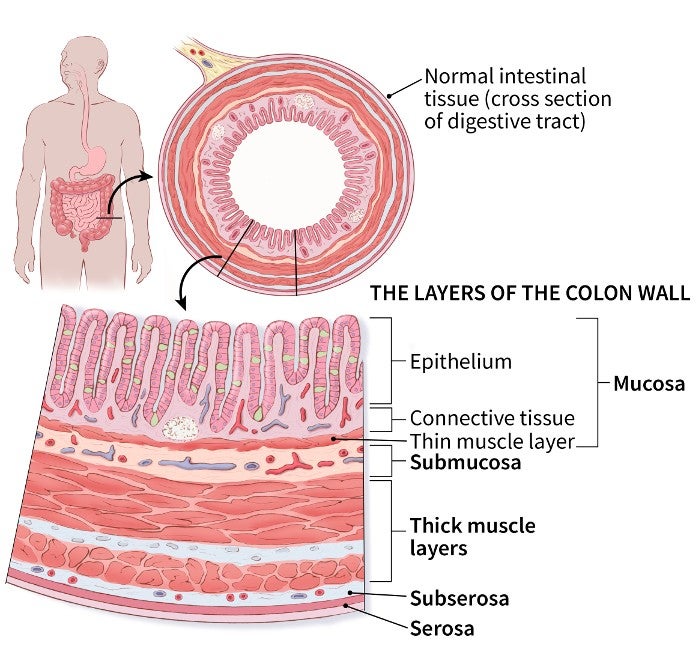
Understanding the Facts about Colorectal Cancer
Below are some FAQ we cover. Be sure to listen to the entire episode for more details.
What age should I get a screening colonoscopy?
The United States Preventive Services Task Force (USPSTF) lowered the colorectal cancer screening age to 45 in 2021. This means all people at average risk should start screening for colorectal cancer at age 45. People at higher risk may need to be screened earlier according to their risk factors (such as lifestyle, family history, or concerning symptoms).
If you have a family history of colorectal cancer or symptoms, especially rectal bleeding, screening should start earlier.
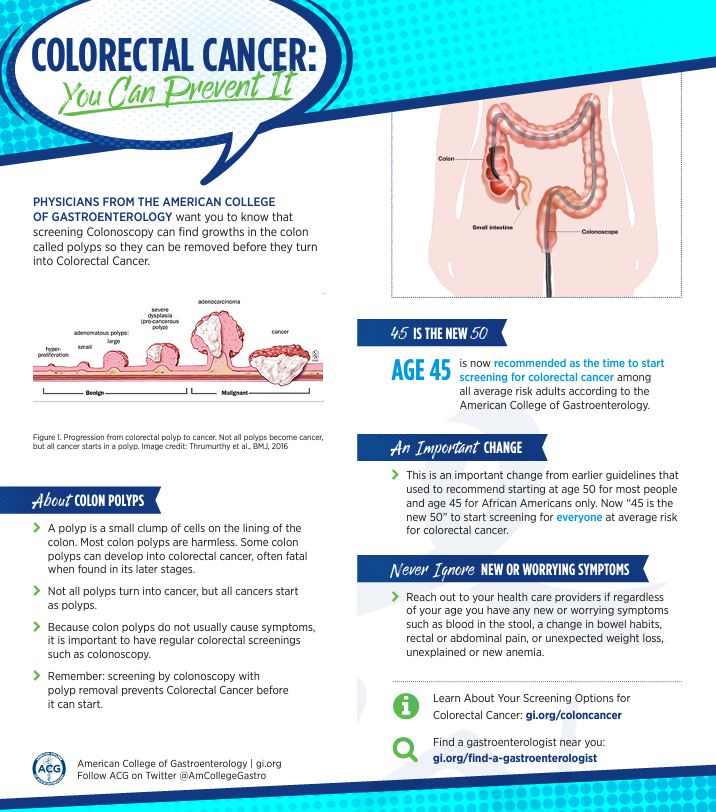
What are the common symptoms of colorectal cancer?
Bleeding from the rectum; blood in the stool or in the toilet after having a bowel movement; dark or black stool; a change in bowel habits or the shape of the stool (e.g., more narrow than usual; cramping, pain, or discomfort in the lower abdomen; an urge to have a bowel movement when the bowel is empty; constipation or diarrhea that lasts for more than a few days; decreased appetite; unintentional weight loss.

What are the risk factors for colorectal cancer?
In the United States, 55% of all colorectal cancers are attributable to lifestyle factors, including an unhealthy diet, insufficient physical activity, high alcohol consumption, and smoking.
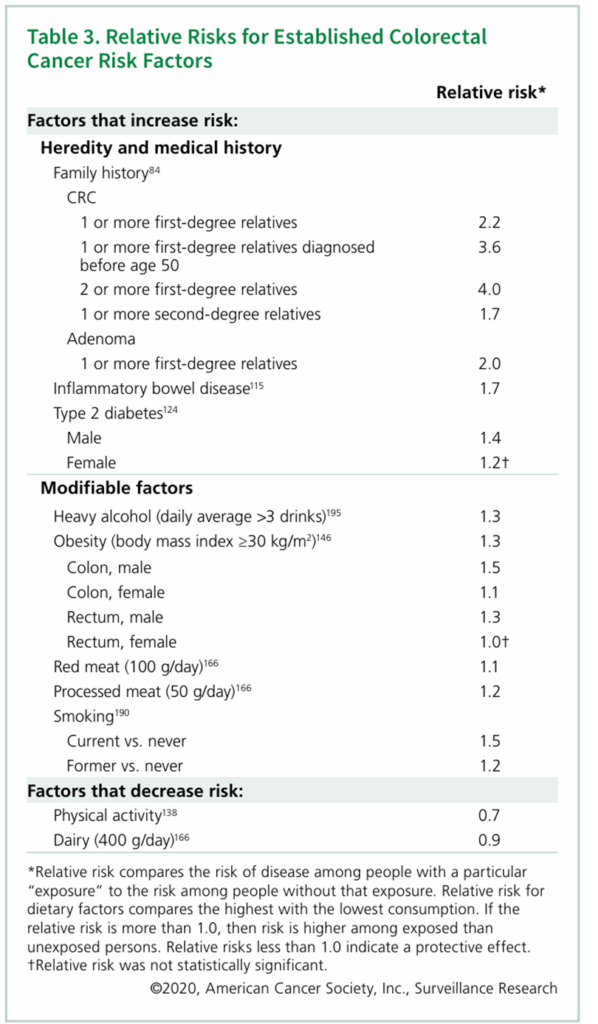

Is colorectal cancer just an “old person’s disease”?
Colon cancer used to be a disease of older people and now as nearly one-third of rectal cancer diagnosis are younger than age 55.
The biggest increase in colorectal cancer cases is in people aged 20-29. Their cancers are often more aggressive. Colorectal cancer is the leading cause of cancer death in men younger than 50, and it ranks second only to breast cancer in women younger than 50.
Chadwick Boseman – famous as Marvel’s Black Panther – was only 39 when he was diagnosed with Stage III colorectal cancer, and he battled it 4 years as it advanced and eventually took his life.
References:
- SEER*Explorer Application (cancer.gov)
- Colon Cancer in Men – Gastroenterologist Describes Common Symptoms (menshealth.com)
- colorectal-cancer-facts-and-figures-2020-2022.pdf
- Colon Cancer Is Rising In Young People: What to Know About Causes and Symptoms – The New York Times (nytimes.com)
- Siegel, R. L., Fedewa, S. A., Anderson, W. F., Miller, K. D., Ma, J., Rosenberg, P. S., & Jemal, A. (2017). Colorectal Cancer Incidence Patterns in the United States, 1974–2013. JNCI: Journal of the National Cancer Institute, 109(8). https://doi.org/10.1093/jnci/djw322
- Sandhu, G. S., Anders, R., Walde, A., Leal, A. D., King, G. T., Leong, S., Davis, S. L., Purcell, W. T., Goodman, K. A., Herter, W., Meguid, C. L., Birnbaum, E. H., Ahrendt, S. A., Gleisner, A., Schulick, R. D., Delchiaro, M., McCarter, M., Patel, S., Messersmith, W. A., & Lieu, C. H. (2019). High incidence of advanced stage cancer and prolonged rectal bleeding history before diagnosis in young-onset patients with colorectal cancer. Journal of Clinical Oncology, 37(15_suppl), 3576-3576. https://doi.org/10.1200/JCO.2019.37.15_suppl.3576
- Keum, N., Giovannucci, E. Global burden of colorectal cancer: emerging trends, risk factors and prevention strategies. Nat Rev Gastroenterol Hepatol 16, 713–732 (2019). https://doi.org/10.1038/s41575-019-0189-8
- Akimoto, N., Ugai, T., Zhong, R. et al. Rising incidence of early-onset colorectal cancer — a call to action. Nat Rev Clin Oncol 18, 230–243 (2021). https://doi.org/10.1038/s41571-020-00445-1
- Colorectal Cancer Awareness Toolkit – American Society of Gastroenterology
- Should I Be Loyal to My Father or My Dying Uncle? – The New York Times (nytimes.com)
- Luke Sharrett‘s Photographs of Arlington National Cemetery Gravestones – The New York Times (nytimes.com)
- What’s to become of the mementos left at Arlington Cemetery? – The Washington Post
Resources:
- Colon cancers are rising among the young: New study outlines the warning signs (medicalxpress.com)
- Younger Adults Are Missing Early Warning Signs of Colon Cancer – The New York Times (nytimes.com)
- Home page | United States Preventive Services Taskforce (uspreventiveservicestaskforce.org)
- Colon cancer is rising in young Americans. It’s not clear why. – The Washington Post
- How Do I Talk About My Family’s Health History of Colorectal Cancer? (short) (youtube.com)
- beseen.care: Join our movement to inspire and encourage people to BE SEEN. In the doctors office. In the workplace. With people that matter most in your life.
- We all deserve to be valued, be heard and be seen.
- How Did Chadwick Boseman Die? Fight Colorectal Cancer!
- Chadwick Boseman’s extraordinary, impactful life: ‘A Tribute for a King’ Part 1
- Questions to Ask Your Doctor About Colorectal Cancer Screening – Colon Cancer Coalition
- National Cancer Institute – Colorectal Cancer
Related Episodes:
- S2E8: Learn to thrive with a Colostomy (Colorectal Cancer Survivor)
What Happens to the Mementos Left at Arlington Cemetery?
Over 3,250 keepsakes were left over the past 15 years in the section of Arlington Cemetery for veterans of Iraq, Afghanistan and Counter-Terrorism operations around the globe. What happens to them? You’ll want to listen to find out.
Should I Be Loyal to My Father or My Dying Uncle?
We discuss the dilemma brought up in New York Times. What are your thoughts?
Recipe of the Week
This week we bring you Macaroni Corn Casserole from Southern Living. Give it a try for the next potluck!


https://blog.feedspot.com/palliative_care_podcasts/
Everyone Dies: and yes, it is normal!
Everyone Dies (and yes, it is normal) is a story about a young boy named Jax who finds something special on the beach where he and his grandpa Pops are enjoying a wonderful day. Pops helps Jax understand that death is a normal part of life. This book provides an age appropriate, non-scary, comfortable way to introduce the important topic of mortality to a preschool child. Its simple explanation will last a lifetime. Autographed copies for sale at: www.everyonediesthebook.com. Also available at Amazon
Mourning Jewelry

We offer a way to memorialize your loved one or treasured pet with a piece of handmade jewelry. When people comment on it and the wearer can say for example “I received this when my mother died” which opens the conversation about this loss. All our jewelry is made with semi-precious stones and beads, vintage beads, and pearls. You can choose between earrings or bracelets and the color family. Learn More



:max_bytes(150000):strip_icc():format(webp)/Mararoni-corn-cassarole-2000-4ebfbcb3d4974b32b02a7cf6451de1cf.jpg)

